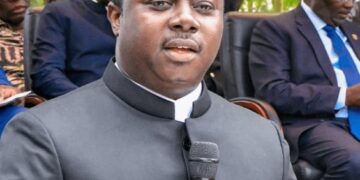The Member of Parliament for Suame, John Darko, has slammed the National Democratic Congress (NDC)-led Mahama government for what he calls an ‘unprecedented” and “scandalous’ move to withdraw criminal charges against leading members of the party.
Addressing the media in Parliament on Tuesday, February 11, 2025, Mr. Darko accused the Attorney General and Minister of Justice, Dr. Dominic Ayine, of deliberately ensuring the acquittal and discharge of NDC officials charged with serious financial and corruption-related crimes.
“The Attorney General has, in essence, turned himself into both a prosecutor and a court of law by ensuring the acquittal of leading members of his own political party. This act of whitewashing and clearing financial crimes is a slap in the face of justice and accountability,” he declared.
According to Mr. Darko, the Attorney General has so far withdrawn cases against several former and current NDC officials, including Samuel Ofosu-Ampofo & Anthony Kwaku Boahen; Stephen Opuni, Seidu Agongo & Agricult Limited; Johnson Pandit Asiamah & 5 Others; Collins Dauda & 4 Others; Ernest Thompson & 3 Others and Cassiel Ato Forson & 2 Others
The charges against these individuals ranged from money laundering, fraudulent breach of trust, conspiracy to commit a crime, and defrauding by false pretences to willfully causing financial loss to the state and corruption by a public officer.
The MP further pointed out that the Attorney General withdrew an appeal to the Supreme Court in the case of The Republic v. Ato Forson & Richard Jakpa, effectively allowing the Court of Appeal’s split decision to stand.
Mr. Darko stressed that these withdrawals were not due to a lack of evidence but rather a political strategy to protect NDC officials from facing justice.
“The trials were at very advanced stages, and the courts would have delivered their verdicts in the year. However, the NDC government has decided that justice should not be served, and Ghanaians should be denied the opportunity of having the courts pronounce on the guilt or otherwise of its officials,” he explained.
He alleged that the decision to withdraw the cases was aimed at granting NDC officials immunity from future prosecution by avoiding the use of a nolle prosequi, which would have left the door open for a future government to revive the cases.
“The Attorney General knew that his people were guilty, and so instead of using a nolle prosequi, he filed a withdrawal to permanently protect them from facing justice,” he alleged.
Hon. John Darko also raised concerns over the high-profile appointments given to some of the individuals who benefitted from the case withdrawals.
Cassiel Ato Forson, previously on trial for financial crimes, has been appointed Minister of Finance. At the same time, Samuel Ofosu-Ampofo has been given a senior position in the Office of the Vice President.
Dr. Johnson Asiamah, who was accused of fraudulent breach of trust and money laundering, has been appointed Governor of the Bank of Ghana.
“Is this a coincidence? Or is this a calculated move to reward individuals who should have been answering for their actions in court?” Mr. Darko questioned.
The Suame MP called on the government to provide clear justifications for the case withdrawals and ensure that justice is applied equally to all Ghanaians.
“We are all Ghanaians and deserve equal treatment under the law. If these NDC officials can have their cases withdrawn, then every Ghanaian facing criminal prosecution should be able to go to the Attorney General’s office and demand the same privilege.”
He warned that such actions could undermine public trust in Ghana’s judicial system and create a dangerous precedent where political affiliation determines who faces the law and who walks free.
The Suame MP expressed deep concern about the state of governance in the country, questioning whether Ghana was becoming a “banana republic” where government officials could evade justice.
Mr. Darko urged civil society, the legal community, and Ghanaians at large to demand answers from the government and push for reforms to prevent political interference in judicial processes.




















































































